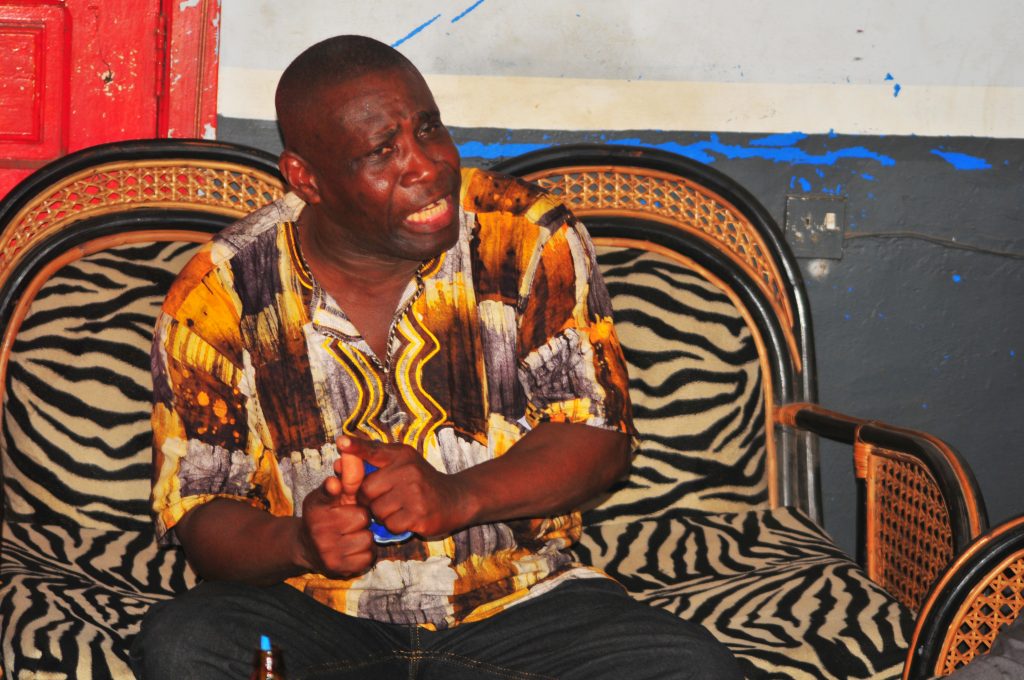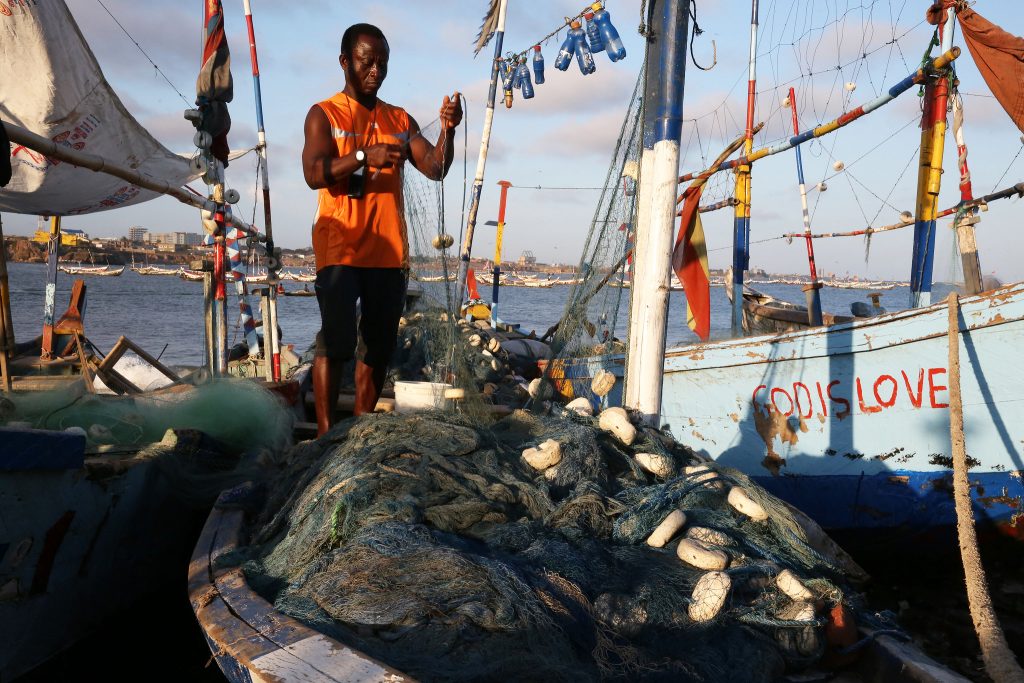Ghana / Interview
The Missing Link
Mike Abaka-Edu, President of the Western Region branch of the Ghana National Canoe Fishermen Council (GNCFC), makes a compelling case for banning ‘saiko’ fishing in this interview with Peter Adjei, a Member of ICSF
This article is by Peter Linford Adjei (pieroquz@gmail.com) of Technical Services for Community Development (TESCOD), Accra, Ghana, and Member, ICSF
The Ghana National Canoe Fishermen Council (GNCFC) was formed in 1982 with the objective of promoting the welfare of canoe fishermen. Since then, it has grown to become an umbrella body of fishers and fishery associations in Ghana. The leadership structure comprises district and regional executives and a national executive committee, which forms the governing body of the council. As of 2020, GNCF had over 100,000 members made up of fishers, chief fishermen, konkonhema (queen fishmongers) and canoe and gear owners.
In its formative years, the council was instrumental in sourcing inputs for its members and collaborated with the government to provide subsidised premix fuel for artisanal fishers. In recent years, however, it has shifted its attention to education and advocacy efforts in response to IUU fishing and other unsustainable fishing practices. Mike Abaka-Edu, who joined the GNCFC in 1998, is the Secretary of the Western Region branch. A staunch advocate of fisheries rights and livelihoods, he has been involved in several campaigns to highlight the plight of small-scale fishers in the marine sector.
…many small-scale fishers complain of frequent incursions into the IEZ by industrial trawlers.
The SSF sector in Ghana plays an important role in providing food security and supporting livelihoods, contributing to 70-80 per cent of the total annual fish catch. In 2018, of the total volume of 452,679.30 tonnes realized, the marine sector accounted for302,431.50 tonnes (67 per cent), followed by aquaculture, with 76,620.00 tonnes (17 per cent) and the inland sector, with 73,627.80 tonnes (16 per cent). In terms of nutrition, Ghanaians consume an estimated 25 kg of fish per capita per year. This is higher than Africa’s average of 10.5 kg and the global average of 20.3 kg. To sustain the socioeconomic contribution of small-scale fisheries (SSF), the Fisheries Act 2002 (Act 625) established the Inshore Exclusive Zone (IEZ) exclusively for SSF. Thus, the use of vessels of 50 or more gross registered tonnage (GRT) or bottom trawl in waters less than 30 m deep is prohibited. However, many small-scale fishers complain of frequent incursions into the IEZ by industrial trawlers. In addition, a far more debilitating practice by industrial trawlers is ‘saiko’, a term used in the Ghanaian fishing industry to refer to the fish passed on (transshipped) by industrial trawlers to canoe operators at sea. According to studies by the Environmental Justice Foundation (EJF), as many as 100 foreign-flagged vessels from the European Union and China are involved in the saiko trade.
Adjei: You have always been a strong voice in the GNCFC. Your appointment as the President of the Western Region branch comes as no surprise to me. I am using this medium to officially congratulate you.

Abaka-Edu: Thank you, I acknowledge the hard work of my predecessors and support from organizations like yours.
Adjei: Thank you for your compliments. The GNCFC and many small-scale fishers are asking the government to ban the transhipment of fish at sea, the one you call saiko. Why?
Abaka-Edu: The simple answer is that saiko is so destructive and unless immediate action is taken, the entire artisanal fishery sector will collapse.
Adjei: Just how destructive is saiko fishing?
Abaka-Edu: First of all, let me clarify one point — what is actually referred to as “saiko fishing” is incorrect. Saiko is not a fishing activity, rather the greedy targeting of small pelagic fishes by industrial trawlers. The law is clear on this: industrial trawlers are licensed to harvest only demersal or bottom-dwelling fish, whereas the small pelagic fishes, including sardinella and chub mackerel, are reserved for small-scale fishers. With saiko, the industrial trawlers deliberately use undersized mesh nets to target the pelagic fishes and freeze them into slabs. These are later transhipped to saiko canoe operatives and middlemen in the value chain.
Adjei: From what you are saying, saiko is supposed to be illegal.
Abaka-Edu: Absolutely. Saiko is the most destructive form of illegal, unreported and unregulated (IUU) fishing in Ghana today. But our worry is not about the illegality of saiko. We fear that if the current rate of saiko is not slowed down, the entire industry will collapse because there wouldn’t be enough juvenile stocks to replenish the large quantities of the illegally caught pelagic fishes. In fact, our research shows that over 90 per cent of the saiko fish caught are juveniles.
Adjei: That is a sobering picture, but is it not true that members of your own organization are also involved in this illegal activity as you put it?
Abaka-Edu: I knew this question would come up. As an organization, we do not condone any form of illegal activity, including saiko.
Adjei: Are you saying that your members are not engaged in the saiko fish trade?
Abaka-Edu: I would not dispute that charge, but let’s put things in perspective. Together with other stakeholders, we have carried out several studies on saiko and we can conclude definitely that there are no more than 1,500 saiko operatives. In contrast, there are over 140,000 small-scale fishers and close to 3 mn dependent traders in the small-scale sector. The national constitution guarantees freedom of association and not every small-scale fisher is a member of the GNCFC. And as I stated earlier, we do not condone any illegality. It is up to the Fisheries Commission and other State institutions to enforce the fishery laws. Should any of our members be found liable, we would co-operate with the law enforcement agencies.
Adjei: I am happy you brought up the law enforcement agencies. You seem to be dissatisfied with their work.
Abaka-Edu: To be honest with you, we are not satisfied with their performance. It is true they have challenges with funds and logistics, but they can do more to sanitize the system.
Adjei: In what ways can they do more with little funds and logistics?
Abaka-Edu: In matters of prosecution, for instance. When there is enough evidence to bring offenders before the law, that should be done without delay. There are instances where fishers engaging in illegal activities were apprehended and handed over to the police, only to be released without prosecution. Similarly, the law enforcement agencies are fully aware of saiko but very little has been done to curb the menace.
Adjei: Are you satisfied with the laws on saiko?
Abaka-Edu: Yes, the Fisheries Act 2002 (Act 625) prohibits all forms of IUU fishing activities and, as I stated earlier, saiko tops the list of the most destructive form of IUU in Ghana. Enforcement of the law has always been the issue. Having said that, GNCFC and, by extension, the small-scale fishery sector would welcome a comprehensive policy to eliminate saiko once and for all time.
Adjei: Many NGOs (non-governmental organizations) and CSOs (civil society organizations) have added their voice to the call to end saiko. Have these yielded any positive results?
Abaka-Edu: Definitely. We must not forget that the campaign to end saiko and the general public awareness on saiko is the result of several years of research and engagements with CSOs, government agencies and small-scale fishers and fishworkers. Studies by the Environmental Justice Foundation (EJF) and investigative journalists, for instance, provided enough data and video evidence that brought the destructive aspects of saiko to life. The onus now is on the Fisheries Commission, MoFAD (Ministry of Fisheries and Aquaculture Development) and other law enforcement agencies to bring a closure to the practice.
Adjei: You recently held a demonstration and presented a petition to government. Can you tell us a bit about it?
… unless urgent measures are taken to address saiko, the livelihoods of some 2.7 mn Ghanaians dependent on the fishery value chain were at risk…
Abaka-Edu: Let me put on record that as an organization, we have always had a fruitful working relationship with the government. On 8 June 2020, together with other stakeholders, we presented a petition to the president, H. E. Nana Addo Danquah Akuffo Addo, to intervene and help end saiko. We stated in our petition that unless urgent measures are taken to address saiko, the livelihoods of some 2.7 mn Ghanaians dependent on the fishery value chain were at risk and inaction would increase poverty and malnutrition in at least 200 vulnerable coastal fishing communities. We also highlighted the fact that engagement with over 2,000 fishers across the four coastal regions shows a significant decline in the small pelagic fish stock popularly called the “people’s fish”, as it is the main source of protein for poor households.
Adjei: You mentioned that ending saiko is all about enforcement of the Fisheries Act (Act 625) and the enforcement agencies have not been able to enforce the applicable laws on IUU. Tell us, how differently do you expect the President to address your concerns?

Abaka-Edu: We are taking advantage of two key factors. First, the president is the co-chair of the SDG (Sustainable Development Goals) Advocates Group and I quote one of his statements on poverty as follows: “This is a time of great hope for the world. If we work smartly together and stay on course, we can raise millions out of poverty and significantly expand basic social services for many more by the 2030 end date of the SDG.” Secondly, the president, through the 2020 budget statement, declared: “The Ministry (MoFAD) will intensify the implementation of the Fisheries Act, 2002 (Act 625) to ensure that domestic, regional, and international laws that prohibit IUU fishing are strictly enforced through the following: … all domestic and international fleet that are involved in saiko fishing (i.e., transhipment at sea) shall be banned from fishing in Ghanaian waters.”
Adjei: In your opinion, what would it take to end saiko in Ghanaian fishing waters?
Abaka-Edu: Saiko is thriving because of weak enforcement of the laws on IUU fishing. The laws must be applied without fear or favour. The regulatory agencies, particularly the Fisheries Commission and related security agencies, including the marine police, must be adequately equipped and expanded as must the use of appropriate surveillance technology and well-trained field personnel. The SSF Guidelines stress the need for consultations and dialogue among those in the SSF sector and other stakeholders, including regulatory agencies and NGOs, in addressing some of these issues. Such dialogues have been the missing link.
Mike Abaka-Edu, Secretary, Western Region, Ghana National Canoe Fishermen Council (GNCFC). The Fisheries Act 2002 prohibits all forms of IUU fishing activities, including saiko, but enforcement of the law has always been the issue, said Abaka-Edu
For more
Ghana National Canoe Fishermen Council (GNCFC)
https://twitter.com/ghanacanoe
Legal Analysis on Trans-shipment of Fish at Sea from Industrial Trawlers to Canoes in Ghana
Rich Rewards of Doing it Right